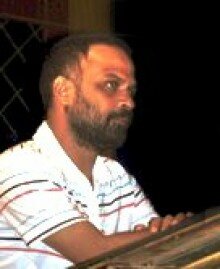
Bharat Majhi (born 1972) is recognised as a voice of growing promise and resonance in the world of Oriya poetry. Born in Ghumerguda in Kalahandi in the state of Orissa, he now lives in Bhubaneswar where he works as a journalist. He has published six collections of poetry in the past decade, his third collection (Mahanagara Padya) winning him the Bhubaneswar Book Fair Award in 2008. He also won the Sanskriti Award in 2004.
‘Some Words’ speaks of the erosion of language in a world of compromise. The words that surfaced in the poet’s dreamworld are a thing of the past; their language of beauty and revelation seems no longer accessible. All around him there are caged words, copulating words, boiling words, mercenary words, drowned words, empty words, mere journalese. But words that address issues of injustice, that confront a land’s seething inequities seem few and far between. They have, as the poet observes dryly, become “too expensive”.
‘I Will Rise This Time for Sure’ is a poem in which the poet rejects the placid resignation and smug self-preservation strategies of the privileged Indian. Bitterly ironic, it is a diatribe against those who choose the convenient image over reality, the prettified picture over the squalid truth. We hear the rage of the poet who has had enough of facile, apolitical aesthetics; the world of art and ideas, if it is to be meaningful, has to engage with what he sees as the unpalatable facts of public life. Majhi has no time for language without conscience, of art “with broken frames”.
It is easy to see why ‘The Old Man on the Verandah of the Junagarh Block Office’ is a poem that has been particularly “well received” (as his translator puts it) in Orissa. The portrait it paints of the Indian Everyman is instantly recognisable. We have all seen him, this shadowy old man in a dusty government office who protests and waits, and will probably continue to protest and wait long into the foreseeable future. He is indignant, he is outraged, but for some inexplicable reason, he is not bitter.
Satire, Majhi tells Rabindra Swain in the accompanying interview, is the last refuge of the artist who finds himself in a failed democracy. “Our writers and intellectuals do not raise their voices against injustice,” he says. “They remain silent. I believe there is no other way but to adopt a satirical mode to write about the elements which have silenced them.”
Bibliography
Dho, Timepass, Bhubaneswar, 2009
Highware Kuhudi, Pakshighara Prakasani, Bhubaneswar, 2008
Murtikar, Pen In, Bhubaneswar, 2006
Mahanagara Padya, Pratchi Prakasani, Bhubaneswar, 2006
Saralarekha, Paschima, Bhubaneswar, 2002
Agadhu Duari, Varsapallavi, Kendrapara, 1999
Also on this site:
Rabindra Swain interviews Bharat Majhi




